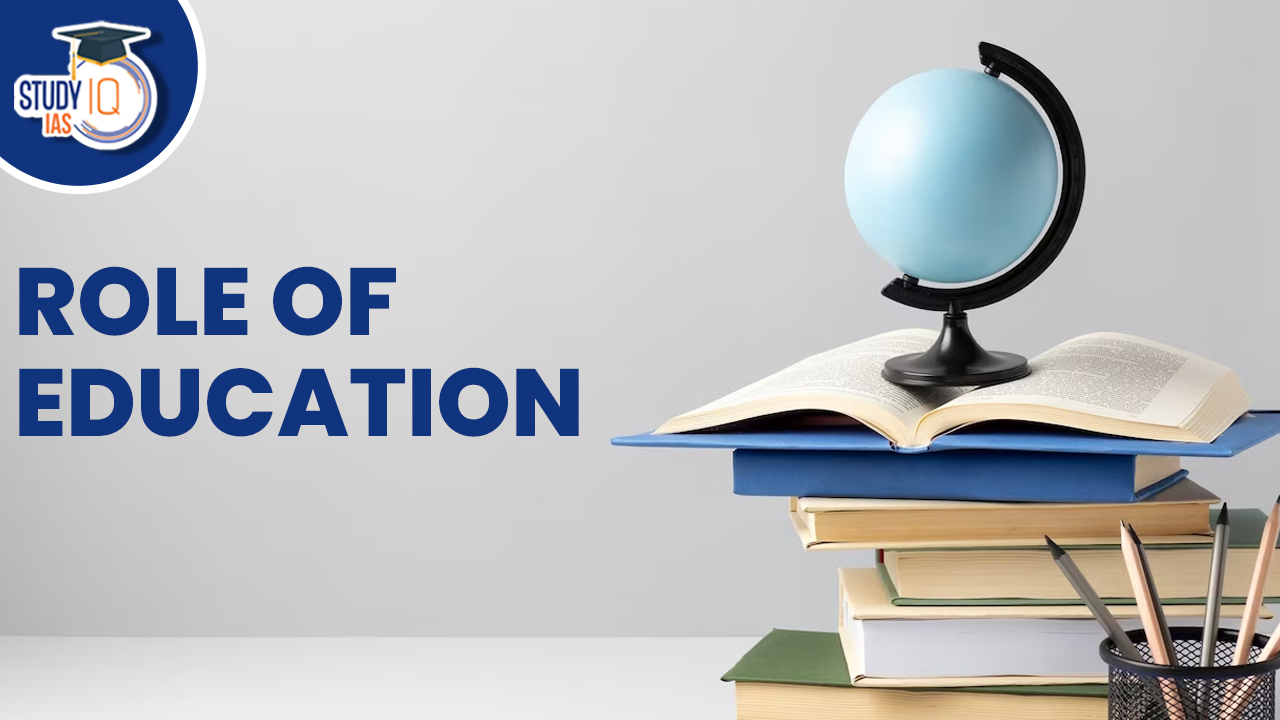Table of Contents
Role of Education
Education is an essential tool for developing skills like decision-making, mental agility, problem-solving, and logical thinking. It also breeds creativity and innovation. In other words, Education is the transmission of knowledge, skills, and character traits. As BR Ambedkar said: “Education is the manifestation of Perfection already in Man “. He also believed that “Education is that which makes men fearless, teaches unity, makes understand their birth rights and teaches them to struggle and fight for freedom”.
According to Sarvepalli Radhakrishnan, where scientific knowledge ends, the realm of mystery begins. The world of scientific facts and the world of values is different. If education does not build wisdom and humanity in the hearts and minds of men, all its professional, scientific and technological triumphs will be meaningless. Therefore on the Birth date of S Radhakrishnan, we celebrate Teachers Day.
Role of Education in Nation-Building
Education shapes a person, just as people are essential in determining a nation’s standing. Every nation is founded on education since it promotes a particular level of knowledge, morals, and awareness and is crucial to the development of technology. Greater literacy rates lead to quicker GDP growth and lower unemployment rates in a nation.
At present, nations are coping with a number of problems, such as a pandemic, terrorism, global warming, poverty, and gender inequality. Whether they are residential or day schools, they are essential in forming both pupils and the nation. Everyone who has access to a top-notch education can contribute to resolving these issues and enhancing living circumstances all around the nation.
Role of Education in Society
Education has many positive effects on society, from enhancing quality of life to fostering the growth of brilliant people with the potential to transform society. Because it provides possibilities for learning knowledge and skills that are genuinely altering the world, education is crucial to society. Not only is the availability of high-quality education crucial for individual growth but also for the growth of society as a whole. The important contributions of education to the society are as follows:
- A more tolerant society
- Better quality of life for vulnerable populations
- Reducing poverty
- Improving the nation’s health
- Reducing crime
- Improving social life
- Developing talents that change the face of humanity
- A large number of educated people improves the life of a community
Role of Education in Economic Development
Education is one of the most important aspects of development. It has a significant impact on a country’s economic prosperity. No country can advance its economy in the long run without making significant investments in its human capital. People’s perspectives on themselves and the world around them are widened by education. It improves their quality of life and offers a wide range of social advantages to both individuals and society. It is essential for assuring social and economic advancement.
It promotes entrepreneurship, technical advancements, women’s empowerment, social development, health awareness, and other areas where economic development can be accelerated. It also aids in the development of human capital, productivity, creativity, and poverty reduction. The following are the important contribution of education to India’s economic development.
- The creation of Human capital is directly related to human development.
- Educated and Skilled labour will help to increase industrial productivity and reduce wastage.
- Education, in every sense, is one of the most important aspects of attaining long-term economic growth through human capital investment which will help in Poverty Reduction
- Increased women empowerment will lead to the high speed of economic growth.
- Social Development from a dark place to a place of optimism.
- Increased awareness of Health, and reduced mortality at all levels.
Role of Education in Human Capital Formation
A more educated society can support a higher level of development than an uneducated one. Education leads to increased income and productivity, which together lead to a more fulfilling existence. In addition to assisting with individual progress, it also advances society as a whole. Education may boost value and improve cultural diversity. Here are a few of the contributions education makes to the development of human capital:
- Education teaches us to care and be empathetic, not only towards others but also to ourselves.
- Education promotes the growth of a country’s economy.
- An educated society always stays ahead and is more progressive than a society with low quality of education and educational standards
- Education also provides the opportunity to enhance the cultural richness.
- Education plays a role not only in the growth of an individual but also in the overall progress of society.
Role of Education in Skill Development
The development of skills includes education as a key component. It gives people the knowledge and abilities they need to excel in both their personal and professional lives. Education is a critical component of skill development since it keeps people abreast of emerging trends and technologies. The significance of education in skill development can be seen in the following ways:
- Knowledge Enhancement
- Competence Improvement
- Increased Employability
- Enhances creativity
- Encourages independent thinking
Role of Education in Sustainable Development
An important instrument for attaining a more sustainable future is high-quality education. This was emphasized at the UN World Summit in Johannesburg in 2002, where it was said that reforming the nation’s educational programs was essential for achieving sustainable development. Assuring environmental protection and conservation, advancing social fairness, and fostering economic sustainability are all goals of education for sustainable development (ESD), which fosters the development of the knowledge, skills, understanding, values, and behaviours necessary to create a sustainable world.
Environmental education, which aimed to equip individuals with the knowledge, skills, values, attitudes, and behaviours necessary to protect the environment, was a significant influence on the development of the ESD idea. ESD aims to empower individuals to make choices and take action that will enhance our quality of life without endangering the environment.
Role of Education in India
Every human being has a fundamental right to education, which plays a significant role in the growth of a country—India, the second-most populous nation in the world, with a literacy rate of about 74%. Despite the fact that several states in India have poor literacy rates, the country’s overall literacy rate is still increasing.
Given how crucial education is to the growth and development of any nation, Kerala leads all Indian states in terms of its rate of literacy, coming in at 94%, followed by Lakshadweep (91.85%), Mizoram (91.33%), and Goa (88.70%). However, Bihar, with a literacy rate of 61.80%, has the lowest literacy rate, followed by Arunachal Pradesh, with a rating of 65.38%, Rajasthan, with a rate of 66.11%, and Jharkhand, with a rate of 66.41%. These figures on the literacy rate make it very evident that India’s educational system has to be improved.
Any nation’s youth holds the key to its future. Youth will be better able to secure a bright future for both themselves and the nation if greater chances are provided and an effective education and learning system is established. Hence the Role of Teacher becomes essential for promoting quality education in the country.
Importance of Education for India
- Earnings rise by about 10% for every extra year of education.
- The gap between workers from wealthy and poor backgrounds in working poverty might be reduced by 39% if they obtained the same education.
- Without at least 40% of its adult population being read, no country in the world has ever experienced rapid and steady economic growth.
- From a mother’s lifestyle before giving birth to their likelihood of contracting ailments in later life, education benefits people’s health throughout their entire lives.
- Prenatal vitamins and other helpful pregnancy strategies are more likely to be used by women with at least six years of education, which lowers the risk of maternal or newborn mortality.
- Education has been shown to benefit girls and women more than boys. There is no other factor that comes close to the personal and economic empowerment that girls experience from school.
Role of Education UPSC
Education and skill development play a significant role in the broader field of human capital. Data on literacy from the 2011 Census give us a fast overview of the state of schooling today. However, literacy is not the only aspect of education. The RTE Act serves as the foundation of Indian education. However, it is the numerous education policies that have been mapped out since Independence that have contributed to the historical growth of the Indian educational system. These policies appear to have produced a variety of consequences. There is a lot of room for development still.
The Kasturirangan report, or the design of a new education policy, is the most recent development in the field of education. It perfectly encapsulates the urgent need for educational reform. India’s contemporary educational system urgently needs to be updated. The draft New Education Policy (NEP) is the ideal time to reflect on the country’s past history, accomplishments, and concerns while also outlining a cutting-edge educational strategy for India in the twenty-first century.


 Jallianwala Bagh Massacre, Date, History...
Jallianwala Bagh Massacre, Date, History...
 Important Lakes of India, State wise and...
Important Lakes of India, State wise and...
 Buddhism History, Origin, Sect, Councils...
Buddhism History, Origin, Sect, Councils...





















